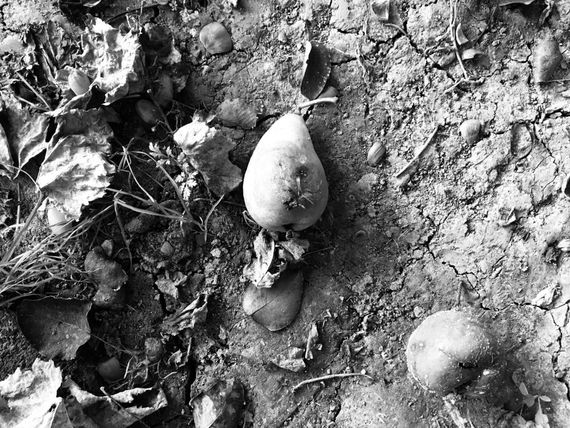If you have ever visited the border towns in the Tavush region of Armenia, the country’s easternmost frontier with Azerbaijan, you know that one can easily tell which way is east from the bullet holes and half collapsed east-facing walls of the homes in the villages. Here you would be hard pressed to find a family that has not lost someone to the war or does not have a family member wounded or disabled by it. The memory and trauma of the war remain deeply rooted in people’s consciousness and the sporadic crossfire that continues decades on results in human and material loss in the communities of these border towns.
If you stay long enough, you can see that the constant anticipation of danger means that only the bare minimum for survival is of importance; everything else can be and is neglected. Here people are ready to share bread or shelter, not necessarily out of generosity but because that is the optimal way to survive while at war. You would also realize that in places like these, in the limbo of war but peace, emotions become unnecessary baggage and are suppressed till times are better.
For sensitive people, it is especially difficult. People can be born hypersensitive or acquire sensitivities as a result of the environment they live in. Parents striving for survival are often emotionally unresponsive towards their children, and generations of children can grow up feeling unloved, misunderstood and learn that emotions need to be hidden, locked away. This behavior is further reinforced when, as adults, they realize that emotional reservedness is encouraged not only by the family but by society as a whole.
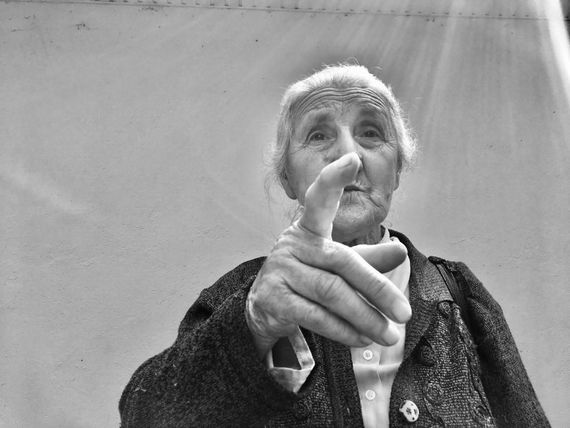
I’ve lived for 73 years; they were spent on the border. I’ve seen everything – war, death, starvation – all kinds of suffering has passed before my eyes. But I sometimes think that all of those difficulties came to an end, they came and went but there is no end to my son’s suffering. It has been 30 years, it is eating him up, eating me up and there is no end in sight. It is my cross to bear till death.
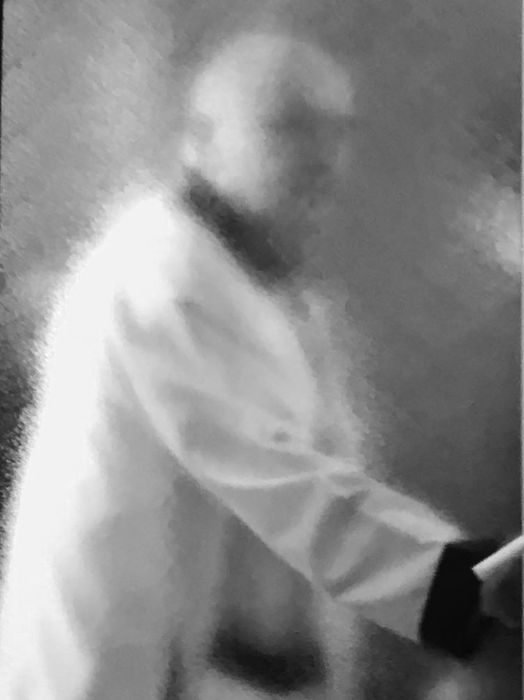
A doctor enters the patient room in a border town clinic.
They say it is hereditary. What can I say, they are the professionals, they must know something but there has been no one with that sickness in our family. Strange people… for example my husband was a very jealous man, would become suspicious for no reason, or it would be more accurate to say that he lived in constant suspicion. I’m strange too [laughing], sure I am. What kind of a person can put her life aside and live someone else’s for these many years. I should have lost it years ago. But God showed me the light, allowed me to be present otherwise my son would be neglected (alone). My other sons were normal, they did not have any psychological issues. This one too was well behaved, quiet, modest and shy as a child. The others would run around and yell, he wouldn’t. I can tell you nothing else that was different about him. He was like everyone else, wouldn’t pick fights, wasn’t suspicious or strange.
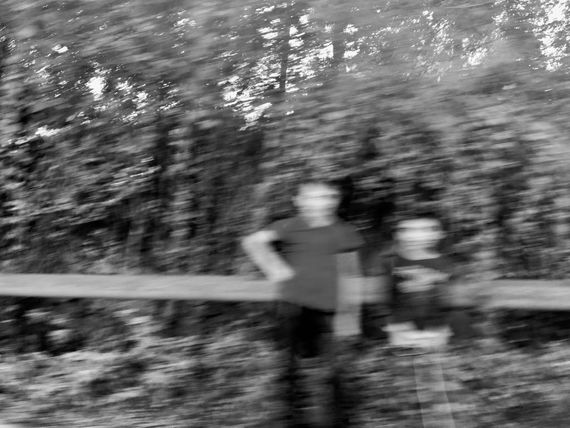
Children on the side of the road between the town of Berd and the border village of Chinari.
He came back from the war like this. He was young, the war was raging, he had no choice but to go, everyone went. Whatever happened in Artsakh… They said there was an explosion next to him, I don’t know what happened then, he got a concussion, got scared, he was wounded, the devil got inside of him? I don’t know to this day. I’m a woman, no one would tell me anything. But whatever came later, that I know.
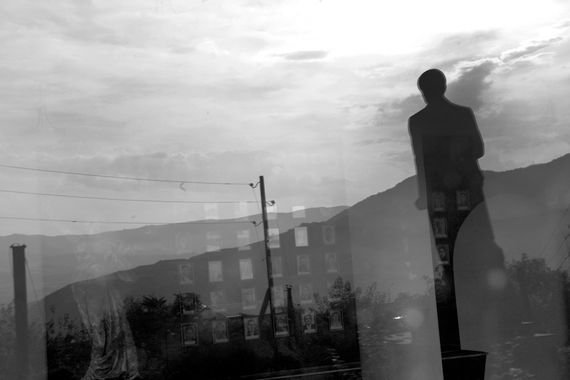
The lobby of a school where the images of all the soldiers form the village who died during the Karabakh War are reflected in the window. The statue in front is of Stepan Shahumyan, a hero of the Soviet Union.
This is how it was for a few years. One day we had a big fight and as if something inside him exploded, he began to talk. He said they are telling him what is happening, what is right and what is wrong; the voice inside his head follows him, protects him from danger. I asked him how come we don’t hear such a voice, how come it is only him who hears it. He smiled and did not reply. Sometimes he would talk to himself, laugh. At first that scared me a lot, then I got used to it. Then he told me that the TV is telling him what to do. The next day he threw the TV out in the trash. I was to afraid to ask him why he did that because he could have turned on me and said that I had something to do with those people.
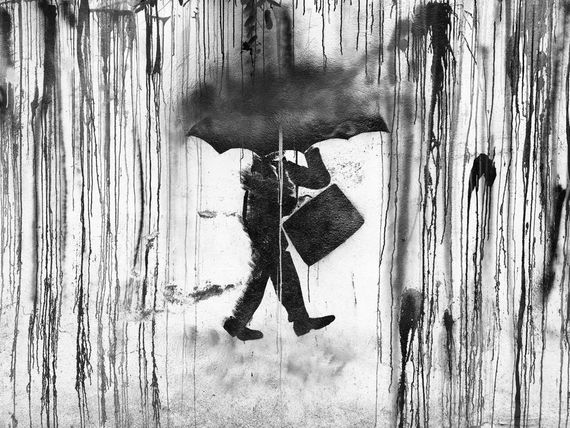
Graffiti art near a park in the town of Berd.
When I saw that he was turning against me, I got really scared. But to tell you the truth, at first I was more hurt than scared. I had dedicated all my life to caring for him, done everything for him and I get this in return? But he is sick and the mind of a sick person works in mysterious ways. He would insist that they were following him. Would smash his phone to pieces once a year out of conviction that it was being tapped. Once I said, “We hardly have anything, stop smashing your phone.” He accused me of being one of them. After that I would not open my mouth, would silently walk away.
It is most difficult for the people around the patient to understand the patterns that are at work when there is delusional behaviour.[4] The delusion gradually becomes more elaborate and in itself becomes the rationalization of everything else around the patient. Every detail is interpreted accordingly, through the prism of the delusion and most often the people closest to the patient (usually immediate family members) become a part of the narrative. The closer the relationship between the patient and the family member, the more caring the latter, the more suspicious and hostile the patient becomes towards them.
Then came a moment when I understood that I need to take him to the hospital, there is no other hope. What parent would want to take their child to the psychiatric ward? I didn’t either. After his first time in, he came home considerably improved. I was so full of hope, thought he might be healed, be like he was before, take care of me in old age. But after a while he stopped taking his medication. A year later he was back at the hospital, again he was better and was sent home but then again he stopped taking the medication.
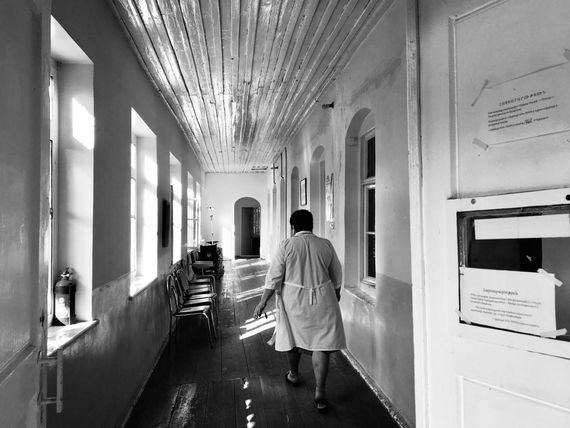
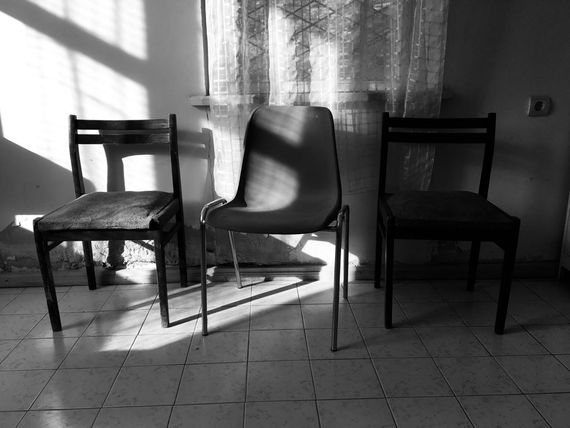
At a health clinic in one of the border villages in the Tavush region of Armenia.
In the beginning my husband was still around, he was able to make him listen. It became harder after he passed away. My other son was already diagnosed with cancer and the other one was in Russia. Then a friend of my husband’s would help me take him to the hospital, a couple of years later, he too migrated. My son died the same year and then the other died in Russia, I never even found out what happened to him. He would get into a lot of fights, but we don’t know if he got into a fight or it was an accident. I was left all alone in an empty house. First my family was gone, then went everything else in the house was gone – some things simply wore out, the rest he smashed to pieces. That is when the real fear set in, there is no one to help us, it is just me and him. Half of my neighbors thought I was a bad mother for committing my son to a “mental asylum,” then when I brought him back home, the other half complained that he will start yelling again and disturbing them. There have been times when people helped, but nothing changed. I have only myself to rely on.
He has been in and out of the hospital. Sometimes a couple of times a year. They admit him for a month, he calms down within days and starts treating me better. Then they send him home and he refuses to take his medication, says it makes him feel bad. There is a shot that he needs once a month, it is supposed to keep him calm but that too we are not able to administer. The doctors are afraid, the nurses are afraid, they say he is dangerous, who knows what he will do. The law enforcement comes, sees that he is aggressive and does not want to deal with him either. I really don’t know what to do, I’ve consulted a 100 professionals, they all say the same thing – give him his medication so that he stays calm and if it gets worse, take him to the hospital.
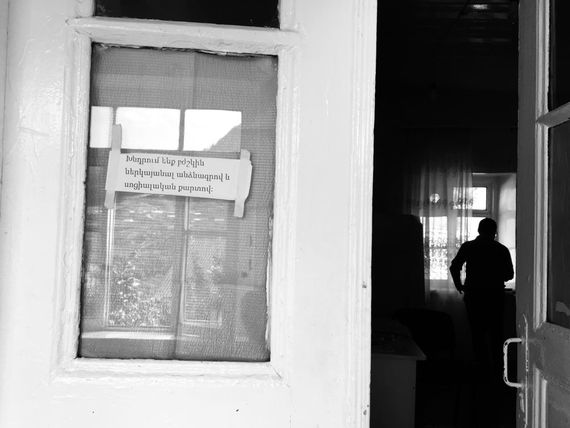
At a health clinic in one of the border villages in the Tavush region of Armenia.
It was late fall when he attacked me physically for the first time. I ran out of the house, went to the neighbor’s to ask for help, they refused. He came out and started shouting. I saw that the neighbors were scared as well, I made my way out of the village and spent the night in the forest. I did not care that it was cold and damp, I just hoped he would not find me. I went to the neighboring village the next day, I went to the priest. He introduced me to kind people to spend the night with. He told me to pray and all will be well. Then I found people who had a house they were not living in. They let me stay there if I needed to, they said, “It’ll be good, you’ll keep an eye on it.” Of course there is nothing in the house but when you are on the run even an empty house is something. The door does not close, I have to put a rock against it to keep it from opening from the wind. I have nothing to fear, neither me, nor anything in that house is of any interest to anyone.
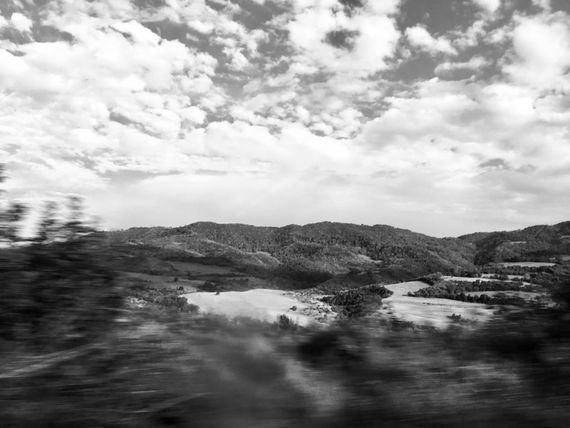
View from the car on the road between Berd and the village of Chinari.
This is how we live now, half of the year I’m with him, and the other half in hiding. It’s a good thing I have my angel watching over me. I feel when he is about to get worse. I don’t let it escalate, I pick up and go to the other house. I think he is even pleased. He has some friends who come over to drink together. They never show up when I’m there. They come as soon as I leave, they stay for hours, they drink and my son drinks with them. They all take advantage of my absence. I’ve asked the mailman to deliver the pension and the social assistance when I’m home, he says “These are not your checks, what do you want with them?” I can not make him understand that I’m my son’s legal guardian by a court decision and he still just delivers the checks to him when I’m not home. I don’t know if he does it on purpose or just because he ignores me. My son spends it all on drinks, 1-2 days later there is nothing of it left.
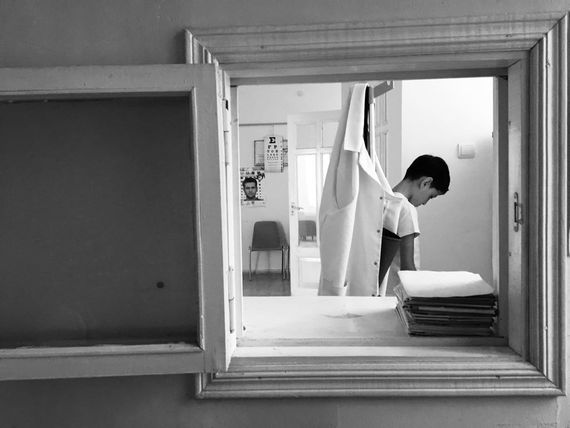
At a health clinic in one of the border villages in the Tavush region of Armenia.
Images by Roubina Margossian.
